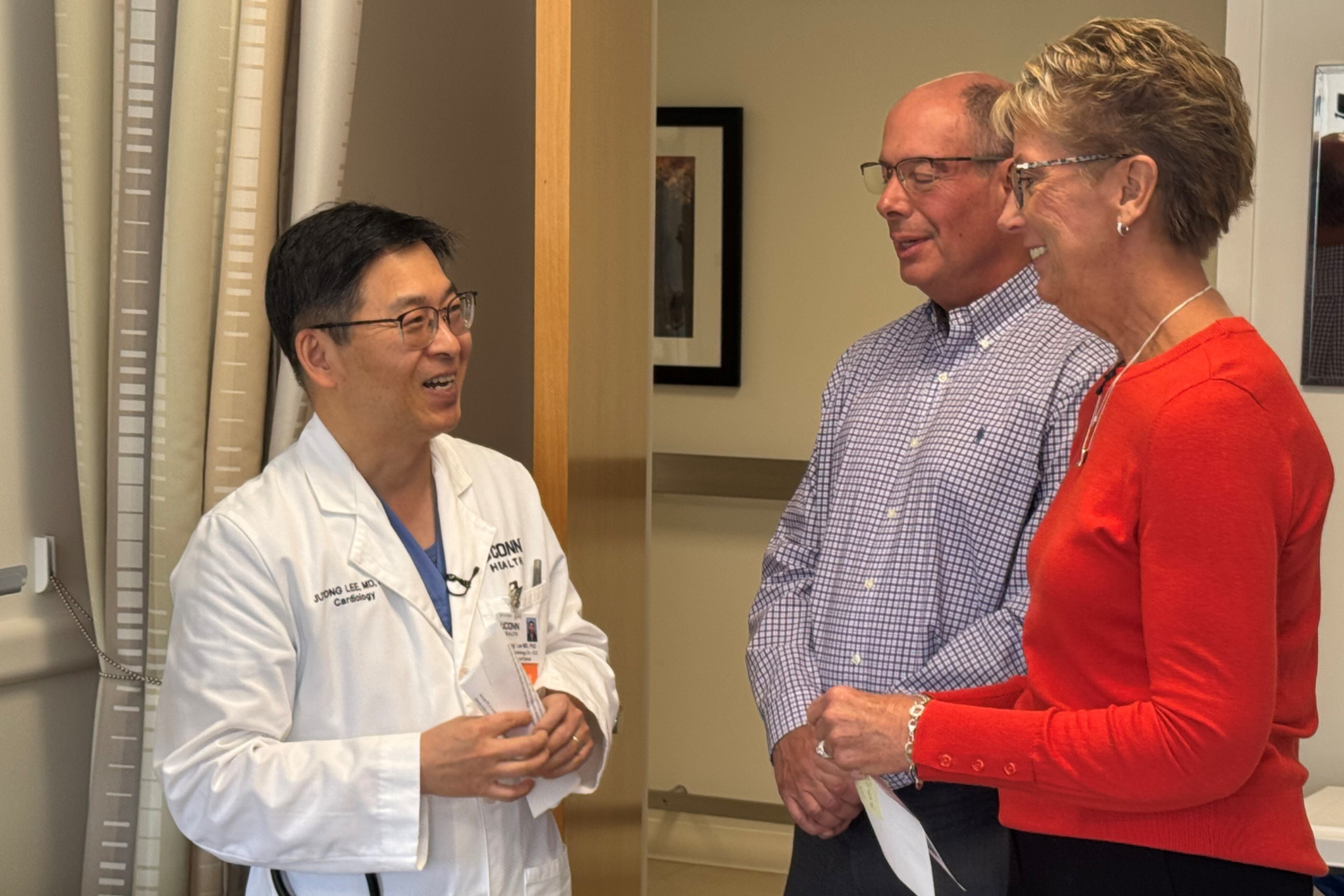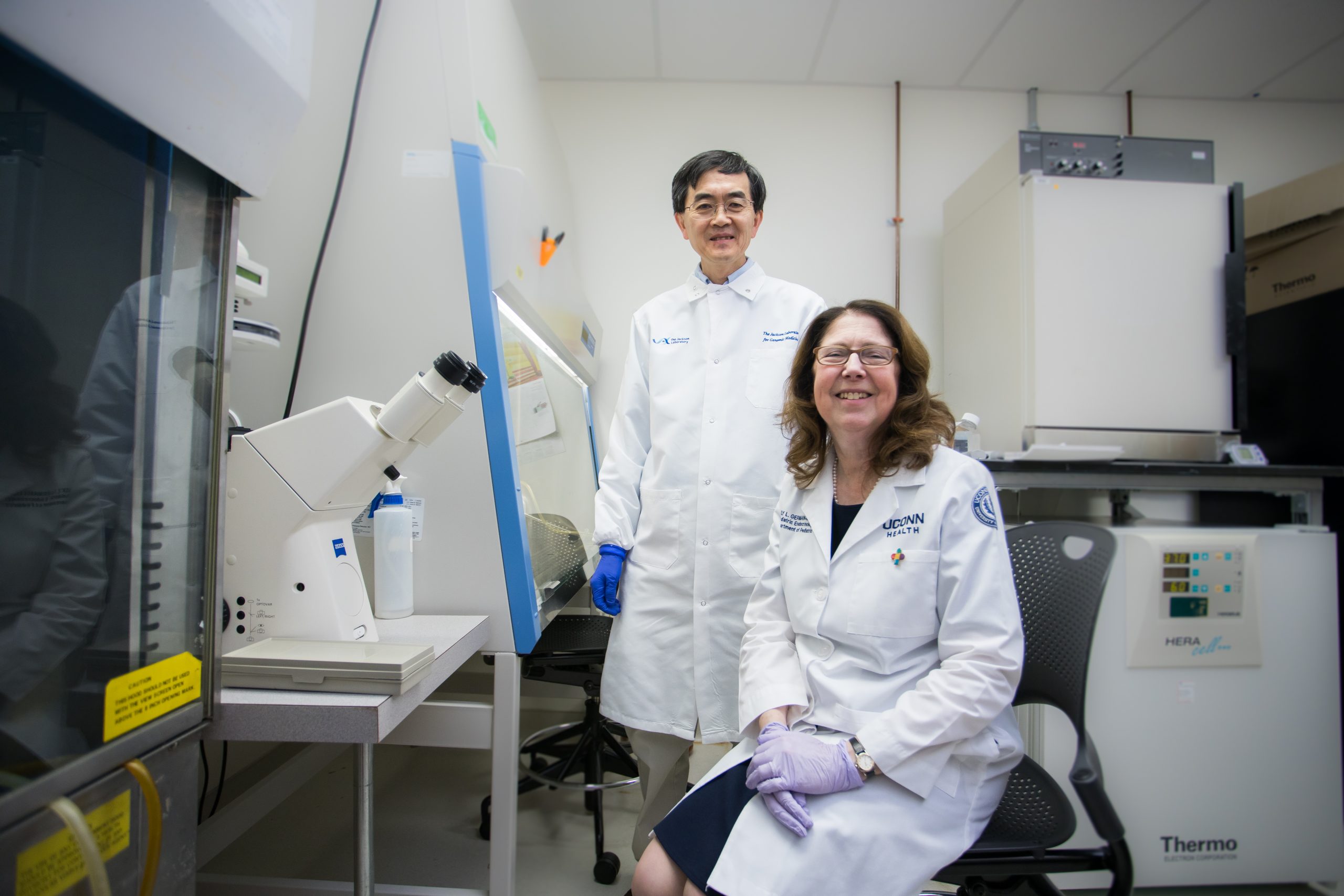A new semester means a fresh start, especially for the newest members of UConn Nation. The fall doesn’t just bring an influx of new students, but new faculty as well.
The UConn School of Nursing welcomed three tenure-track faculty members, a new director of simulation-based education, and an associate professor from UConn’s Department of Allied Health Sciences for the Fall 2020 semester.
“Our number one priority is to provide our students with an exceptional nursing education,” says Dean Deborah Chyun. “Our talented faculty are tackling distance learning head-on and imparting valuable knowledge to our students as they prepare to enter the health care industry. I am thrilled with the experience, research, and innovation our new faculty members are bringing to our School.”
Eileen J. Carter
Carter’s background is in emergency department nursing and she is passionate about how research can improve patient safety and outcomes. She has received national grant funding to study the dissemination and implementation of infection prevention and antibiotic resistance practices.

“I was drawn by UConn School of Nursing’s strong reputation, and its commitment to and successful track record of public service and quality research,” Carter says. “Students and faculty alike esteem the School for its scholarly expertise, nurturing atmosphere, and tremendous opportunities for interdisciplinary collaboration.”
Carter received her bachelor’s degree in nursing from New York University, before going on to earn her MPhil and Ph.D. at Columbia University. In 2014, she was the first to enter a jointly appointed research position at Columbia University School of Nursing and NewYork-Presbyterian Hospital, seeking to connect scholarly efforts across the institutions.
Seeing her potential, UConn has accepted Carter into its Pre-K Scholar Career Development Award Program. The two-year program is designed to equip junior faculty with the knowledge of how to effectively apply for an NIH Research Career Development Award — also known as a K award. The program’s long-term goals are to increase the pipeline of researchers applying for K awards and help them become leaders in clinical and translational science.
Christine Tocchi
Tocchi has more than 20 years of experience in the education of gerontological nursing students and providing care to older adults. She has spent the past six years as an assistant professor at Duke University.

Tocchi received her bachelor’s degree in nursing from St. Anselm College, and her master’s degree and Ph.D. in nursing from Yale University. Her postdoctoral fellowship was at the New York University College of Nursing.
Tocchi’s research and work has focused on frailty prevention in older adults. She co-initiated a primary care home visit program for frail homebound older adults, initiated a Nurses Improving Care for Healthsystem Elders (NICHE) program within an acute care hospital, and was a health provider and director of patient care at a long-term care facility.
“I am delighted to be joining the renowned faculty of UConn’s School of Nursing,” Tocchi says. “The school’s commitment to research, education, and public service is an exemplar of an academic environment supportive of the development of innovative and new nursing knowledge and future nursing leaders to improve health care across settings and populations.”
Gee Su Yang
Yang completed her postdoctoral training at the University of Florida through an NIH National Research Service Award F32 fellowship. During her time in Florida, she advanced her clinical research knowledge and skills in symptom science, specifically focused on aromatase inhibitor-associated musculoskeletal symptoms in breast cancer survivors.

She received her bachelor’s and master’s degrees in nursing from Seoul National University in South Korea, and her Ph.D. from the University of Maryland School of Nursing.
During her pre-doctoral program, she studied pain and omics discovery methodologies to investigate underlying mechanisms and treatment strategies of various types of pain, such as cancer-related pain, inflammatory pain, neuropathic pain, and musculoskeletal pain, using an animal model.
“I decided to work at the UConn School of Nursing because there are rich research infrastructures, resources, and support for basic, translational, and clinical research, and there are mentors and colleagues to work with in my area of interest,” Yang says. “I am very excited to be a part of the UConn family.”
Judy Brown
Brown transferred to the School of Nursing from the College of Agriculture, Health and Natural Resources’ Department of Allied Health Sciences.

“A move to the School of Nursing is an exciting opportunity for me to learn from and collaborate with qualified practitioners who are mindful of the need for dynamic continuing health care professional education,” Brown says. “I am grateful to be welcomed and look forward to being among the creative faculty who design and lead the successful and highly regarded programs of the School.”
Brown is a certified clinical laboratory specialist in both cytogenetics and molecular biology with a Ph.D. in genetics and genomics. As director of the chromosome core division of the Center for Genome Innovation (CGI), she examines chromosome integrity of human-induced pluripotent stem cells created to mimic diseases such as autism, Angelman and Prader Willi syndromes, and psychiatric disorders.
Recognizing a need for individuals with advanced training in genome-based technologies and clinical genetics, Judy developed and serves as director for the Institute for Systems Genomics’ innovative Health Care Genetics Professional Science Master’s Degree Program, co-sponsored now by the School of Nursing and the Department of Allied Health Sciences.
Valorie MacKenna
MacKenna joined the School of Nursing in July as the new director of simulation-based education.

MacKenna came to UConn from the University of Central Florida in Orlando, where she was a graduate teaching assistant and received her Ph.D. She graduated from the University of South Florida in 2010 with her bachelor’s degree in nursing and master’s in nursing education and has over a decade of experience in labor/delivery nursing.
In 2016, MacKenna became a Certified Healthcare Simulation Educator and her research focuses on simulation-based learning, debriefing methods with virtual simulation, and nursing education.
“I’m excited to be a part of the team at the School of Nursing and look forward to contributing to the growth of the Clinical Simulation Learning Center,” MacKenna says. “I see great opportunities to collaborate with other dedicated educators as we develop the next generation of nurses through experiential learning!”
Follow the UConn School of Nursing on Facebook, Instagram, Twitter, or LinkedIn.



